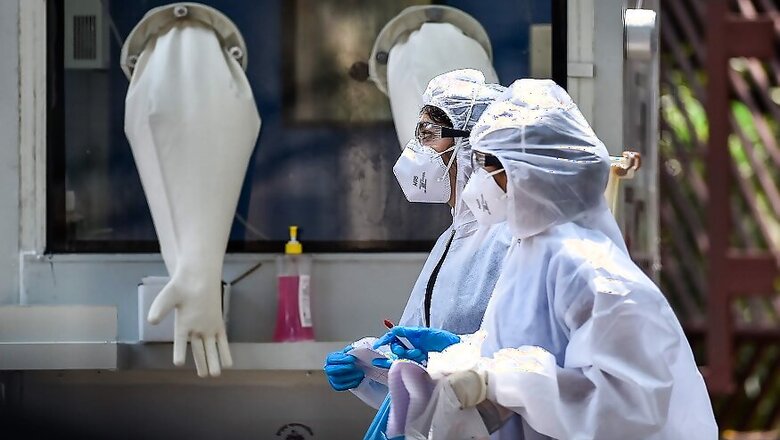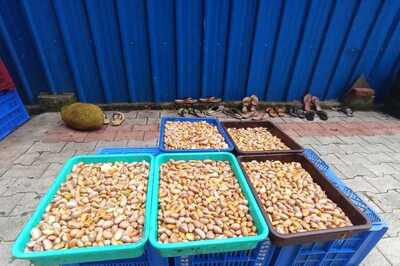
views
New Delhi: Globally, the scientific community is racing against time to repurpose drugs and study their efficacy against Covid-19. A drug that has been in news is the antiviral Remdesivir, developed by US-based Gilead Sciences Inc. Findings of a randomised controlled trial study of Redemisivir, conducted in Wuhan, China, were published in medical journal Lancet on Wednesday. The study did not show any statistically significant clinical benefits of the drug compared to a placebo, substances that are like drugs without any actual drug ingredients.
Soon after the study was published, Dr Anthony S Fauci, Director of the National Institute of Allergy and Infectious Diseases, said Remdesivir shortened the time for recovery among patients, early results of a clinical trial showed.
What does this indicate and what is the status of other drugs that the Indian government is looking at for using as a line of treatment against Covid-19? What is the process being followed to test the efficacy of these drugs and which drugs are being tested in trials? News18 explains.
What are the different drugs being ‘repurposed’ or tested for efficacy against Covid-19?
There is no drug that has proven to be effective as treatment against Covid-19. While there is a race to create a vaccine against the infectious disease, countries across the globe are also conducting clinical trials on ‘repurposed drugs’. These are drugs that have already been used extensively to treat other diseases such as HIV, Influenza, Malaria and even Arthritis. These classes of drugs are known as antiviral (used against flu), antibiotic, antiretroviral (used against HIV) and immunosuppressive drugs.
Among those drugs that are being tested to check their efficacy against Covid-19 are Remdesivir, Favipiravir, Interferon beta-1A, Hydroxychloroquine, Lopinavir/Ritonavir, Tocilizumab and Umifenovir. As stated earlier, Remdesivir had shown contradictory results in two randomised clinical trials (RCT) that were done in China and US while Favipiravir is on the verge of being tested in an RCT in India. The mechanism of treating different diseases using the drugs in question have similarities with the way they we could potentially treat Covid-19.
What is Remdesivir?
According to the government’s task force on repurposing of drugs, Remdesivir is an antiviral that was used in a limited manner against Ebola infectious disease during its outbreak in Africa. It is an experimental drug and is produced by Gilead Sciences Inc, a US-based pharmaceutical company. It has generated promising results in animal studies for Middle East Respiratory Syndrome (MERS-CoV) and severe acute respiratory syndrome (SARS) which are also caused by coronaviruses, suggesting that it may have some effect in patients with Covid-19, the World Health Organization said.
What did the trials in China and US show?
Dr Fauci, leading infectious disease expert in the United States, said Wednesday that early results from a crucial clinical trial underway in US showed that the experimental antiviral helped patients to recover quicker from Covid-19 illness. Fauci said patients given Remdesivir recovered 31 per cent faster than those given a placebo and he termed the development as “highly significant”.
However, another randomised clinical trial done in China, though on a smaller group of people, showed that Remdesivir did not improve the condition of patients significantly compared to the placebo or dummy drug. The paper also said though there was numerical reduction in time to clinical improvement in those treated earlier, this requires confirmation in larger studies. Thus, even as the jury is still out on the drug’s impact against Covid-19, it is also the first one to have shown some positive effects in early trials. With trials of other drugs lined up, it is early to say whether Remdesivir is the most effective drug against Covid-19.
What is the WHO’s solidarity trial?
To integrate some of the overlapping efforts of scientists from across the world to find an effective treatment for Covid-19, the World Health Organization launched an international ‘solidarity clinical trial’. The solidarity trial will compare four treatment options against standard of care, to assess their relative effectiveness against Covid-19, the WHO said. One of the crucial reasons for this effort is to expedite the process of trials and increase their scale. It usually takes years to design and conduct clinical trials for emerging diseases. WHO said that the solidarity trial will reduce such time taken by 80%.
“Enrolling patients in one single randomised trial will help facilitate the rapid worldwide comparison of unproven treatments. This will overcome the risk of multiple small trials not generating the strong evidence needed to determine the relative effectiveness of potential treatments,” the WHO had said. Over 100 countries are working together on this issue. Based on evidence from laboratory, animal and clinical studies, Remdesivir, Lopinavir/Ritonavir, Lopinavir/Ritonavir with Interferon beta-1a and Chloroquine or Hydroxychloroquine were the options selected for the trials.
What is the assessment of Indian government of these drugs?
The government’s task force on repurposing of drugs did a first-of-its kind assessment last week on the drugs that have potential for Covid-19 treatment. News18 was the first to report this assessment which showed that Antiviral drug Favipiravir and immune-modulator drug Tocilizumab are the most promising drugs in terms of their readiness for use and potential for Covid-19 treatment.
The task force has said that this assessment, based on scientific literature available globally, will be dynamic in nature. As and when information and findings of clinical trials get updated, the assessment and scoring of drugs will reflect the change. Favipiravir is an anti-viral drug and it is approved in Japan for treating influenza. It is currently being tested in 18 clinical trials for Covid-19 and results from two studies have shown a positive outcome while data from other trials is awaited.
The task force is also evaluating the patent barriers in the event an effective drug has to be produced in India on an urgent basis.




















Comments
0 comment